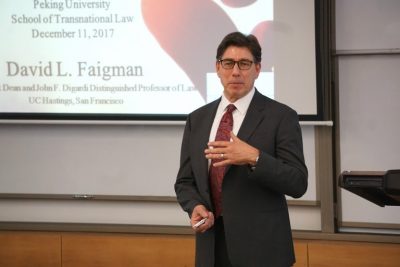On December 11, STL welcomed David Faigman, the John F. Digardi Distinguished Professor of Law and Chancellor and Dean of the University of California Hastings College of Law. Professor Faigman, who also holds an appointment as Professor in the University of California, San Francisco School of Medicine, delivered a public lecture on “The Challenges of Integrating Scientific Research Into Legal Decision Making.” Professor Faigman is an acclaimed scholar of law and science and scientific evidence. His talk focused on the capacity of courts and the respective roles of judges and juries in evaluating the reliability of scientific evidence. He discussed the 1993 landmark case Daubert v. Merrell Dow Pharmaceuticals, Inc., in which the U.S. Supreme Court held that judges are gatekeepers and must ensure that the underlying basis for the scientific evidence is reliable and valid. He described the courts inconsistent application of the Daubert standard and offered his suggestions for best practices in this area.

Professor Faigman was joined by his colleague, Keith Hand, Professor of Law and Associate Dean for Global Programs at UC Hastings. STL and UC Hastings are working on a collaboration agreement regarding student and faculty exchange.
Professor Faigman received his M.A. (Psychology) and J.D. from the University of Virginia. He is the author of three books and over 50 articles and essays appearing in publications, such as the Chicago, Pennsylvania and Northwestern University law reviews, Science, Sociological Methods & Research, Nature, Neuroscience, and Oxford Press. He is a co-author of the five-volume treatise, Modern Scientific Evidence: The Law and Science of Expert Testimony (with Cheng, Mnookin, Murphy Sanders & Slobogin). He was a member of the National Academies of Science panel that investigated the scientific validity of polygraphs, served as a Senior Advisor to the U.S. President’s Council of Advisors on Science and Technology’s Report, “Forensic Science in Criminal Courts: Ensuring Scientific Validity of Feature-Comparison Methods,” and is a member of the MacArthur Law and Neuroscience Network.